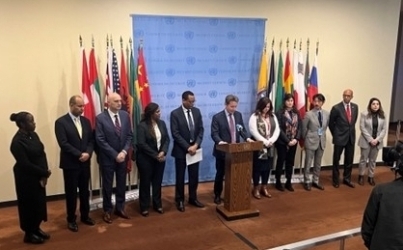気候・平和・安全保障に関する共同プレッジ参加国による中央アフリカ地域/UNOCAに関する共同プレスステークアウト
令和5年12月13日

We, the eleven Security Council members signatories of the Joint Pledges related to Climate, Peace and Security - Albania, France, Gabon, Ghana, Japan, Malta, Mozambique, Switzerland, the United Arab Emirates, the United Kingdom, and the United States - have come together today on the occasion of the briefing to the Security Council this afternoon on the Central African region and the report on the UN Regional Office for Central Africa (UNOCA). We express deep concern regarding the increasingly severe adverse impacts of climate change on the peace and security of Central Africa, while also noting the enormous potential of Central Africa in the global fight against climate change, and call for urgent action.
Central Africa remains among the world's most vulnerable subregions to the impacts of climate change, with temperatures rising higher than the global average, increasingly unpredictable rainfall patterns, severe droughts and floods, southward expansion of the Sahara desert, the shrinking of Lake Chad, soil erosion along the coastline and accelerated sea-level rise in the Gulf of Guinea. The impacts of climate change can exacerbate inter-communal conflicts – including among farming, herding and fishing communities; and can contribute to migration and displacement, non-state armed group recruitment and crime in several areas across the sub-region as well as piracy and maritime crime in the Gulf of Guinea. Women, youth and vulnerable communities, including refugees and internally displaced persons, are disproportionality affected by the impacts of climate change, and humanitarian needs keep rising.
At the same time, Central Africa is a subregion with significant potential when it comes to climate, peace and security. We welcome commitments made by the governments of the Central African region to support the continued conservation and sustainable management of the Congo Basin rainforest and peatland ecosystems to preserve its status as one of the last remaining critical forest carbon sinks. In addition, climate resilience and adaptation can also be an important lever for peacebuilding in the sub-region. The link between climate and security thus remains a key priority for Central African countries and for regional cooperation.
The climate, peace and security work of UNOCA is essential for Central Africa. To strengthen the sub-region’s resilience to the impacts of climate change, UNOCA works in close collaboration with the Economic Community of Central African States (ECCAS) and its member States, civil society - including youth groups, academia, and UN presences to advance climate, peace and security in Central Africa.
We encourage continued collaboration between ECCAS, its member states and UNOCA at various levels, including towards the adoption of a regional protocol on transhumance as well as the finalization of a conflict-sensitive regional strategy on climate change and resilient development. We also note the envisaged regional consortium on climate change, biodiversity, peace and security, transhumance, climate finance and sustainable development in Central Africa.
To inform the Security Council and enable more holistic responses to the impacts of climate change, we reiterate the critical need to further enhance data collection and analysis. The UNOCA Climate Security Advisor has a unique role in this respect.
